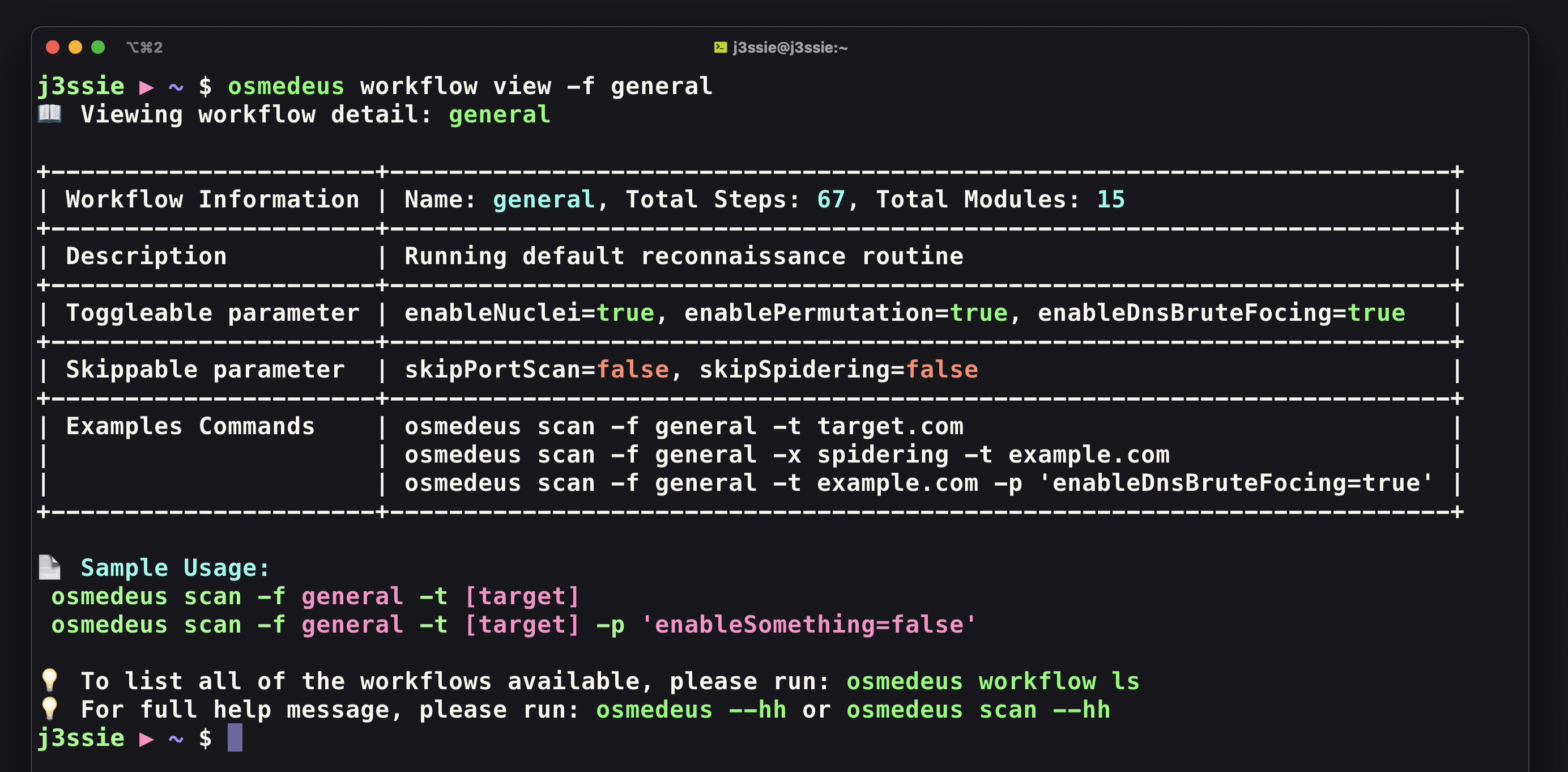 Running Your First Scan¶
Running Your First Scan¶

You can slowdown or speedup the scan by provide a --tactic or --threads-hole command line flag?
By default the threads hold for the workflow will equals of your number of CPUs, but you can change it by using --threads-hold=20. You can also use --tactic=gently flag to slowdown or the --tactic=aggressive speedup the scan.
for example: osmedeus scan --threads-hold=10 -t example.com
Running the command osmedeus workflow ls to show full workflow, osmedeus workflow view -f general to show the detailed about the workflow and osmedeus scan -hh to see the full help of the scan command
To avoid encountering errors, it is important to ensure that the scan is executed using the correct input format.
Please review the input example and select the workflow that best suits it in order to achieve optimal scanning results¶
If your input is a domain or a list of subdomains¶
Example inputs: example.com , target.co.uk
If your input is sub.example.com and you are aware that there are NOT many subdomains associated with it (such as another.sub.example.com), then it may not approriate to run the general workflow.
1. If you desire a comprehensive scan that encompasses subdomain enumeration, DNS probing, and vulnerability scanning
Example commands
# running default flow -f 'general'
osmedeus scan -t example.com
# Running extensive reconnaissance routine with in-depth module + bigger wordlists
osmedeus scan -f extensive -t example.com
2. If you desire to perform a quick summary data analysis to get subdomain and DNS probing only
Example commands
osmedeus scan -f fast -t example.com
# only run subdomain enumeration
osmedeus scan -f subdomain-enum -t example.com
osmedeus scan -m brutefocing-subdomain -t example.com
3. If you desire to perform a rapid routine and conducting a vulnerability scan on it
Example commands
osmedeus scan -f vuln -t example.com
If your input is a URL or a list of URLs¶
Example inputs: Your input is a file that includes a catalog of URLs or IP addresses, along with subdomains such as https://sub.example.com , internal.app.example.com, https://evil.com/path, https://1.2.3.4, 3.4.5.6, etc
The workflows listed below solely permit input in the form of a file. If your input is not in the file format, kindly arrange it in a file prior to execution.
Example commands
osmedeus scan -f urls -t list-of-urls.txt
# This will automatically convert the input into a file named http-sub.example.com.txt
osmedeus scan -f urls -t https://sub.example.com/
osmedeus scan -f domains -t list-of-domains.txt
# using with module
osmedeus scan -m http-probing -t list-of-domains.txt
osmedeus scan -m vuln-scan -t list-of-domains.txt
osmedeus scan -m content-discovery -t list-of-domains.txt
osmedeus scan -m content-discovery -t list-of-urls.txt
If your input is a CIDR or a list of CIDRs¶
Example inputs: Your input is a file that includes a catalog of IP addresses, CIDR such as 1.2.3.4/24 , 3.4.5.6, etc or a simple CIDR like 1.2.3.4/24
Example commands
osmedeus scan -f cidr -t list-of-cidr.txt
# This will automatically convert the input into a file named 1.2.3.4/24_random.txt
osmedeus scan -f cidr -t 1.2.3.4/24
osmedeus scan -f cidr-probing -t 3.4.5.6/24
If your input a URL, a GitHub/GitLab repository, or a directory containing source files¶
Example inputs: https://github.com/juice-shop/juice-shop (only apply for GitHub or GitLab link), /tmp/source-code-folder
Example commands
osmedeus scan -m repo-scan -t https://github.com/juice-shop/juice-shop
osmedeus scan -m repo-scan -t /tmp/source-code-folder
osmedeus scan -m repo-scan -T list-of-repos.txt
View of all toggleable and skippable parameters in the workflow.¶
